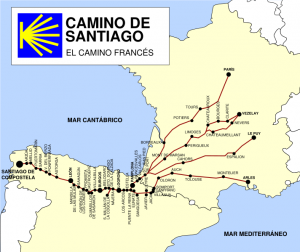El Camino de Santiago
When I was a kid we would do this thing called “El Camino de Santiago” which is a walk that actually goes from France all the way to Galicia in Spain—Santiago de Compostela—but instead of doing it like that, we would make a route around my city, around Toledo, starting at one of one of the outside little towns and finishing at the top of the city.
El Camino de Santiago appears to be a rite of passage that connects young Spaniards with the countries historical past and inaugurates them into Spanish society. Everyone in Sergio’s city—Toledo—participates in this event, as do many others throughout Spain. Whereas few people male the full trek from France to Santiago de Compostela, the majority complete shorter walks that are meant to represent the long journey between the two countries.
Santiago de Compostela is a city in northwestern Spain that is known to be the resting place of Saint James. In the past, El Camino de Compostela was an important Christian pilgrimage akin to the pilgrimage made to Jerusalem by Jews.
As the majority of Spaniards complete a shorter version of the walk it can be related to a shorter canonized version of a longer folktale in which the essence of the tale remains but details are altered here and there.
Sergio has completed this shortened walk many times but has no intention to make the full journey from France. It is a tradition that his family has upheld for decades. Since they moved from Spain to Miami they no longer continue to make this short trek around their city.
I am not aware of any walk in the United States in which the walking represents walking done in the past. There are many charities that use the act of walking to raise awareness and money, but there exists no walk, for example, that represents slaves walking from the deep south to the north with the hope of achieving freedom or of Lewis & Clark walking to the pacific ocean and back.
Annotated:
El Camino de Santiago appeared in the 2010 film The Way (directed by Emilio Estevez and starring Martin Sheen), which tells the story of father who heads to Europe to collect the body of his son who died while making the trek from France to Galicia. Once he arrives he himself decides that he wants to make the trek himself to both avenge his son and test his limits. For the father this walk journey is not so much a rite of passage as much as a challenge he presents to himself.

